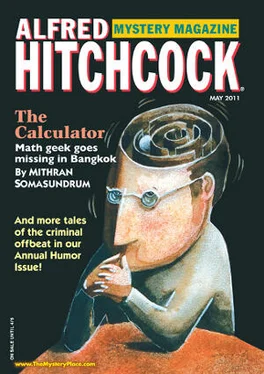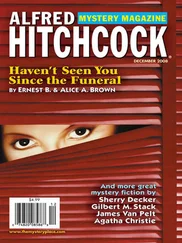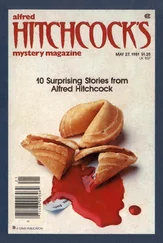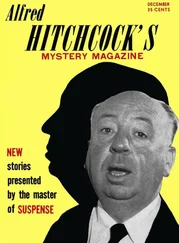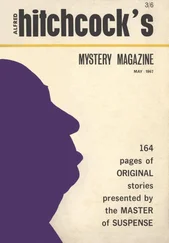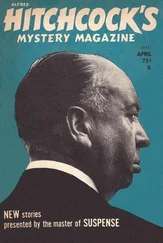Robert Lopresti - Alfred Hitchcock’s Mystery Magazine. Vol. 56, No. 5, May 2011
Здесь есть возможность читать онлайн «Robert Lopresti - Alfred Hitchcock’s Mystery Magazine. Vol. 56, No. 5, May 2011» весь текст электронной книги совершенно бесплатно (целиком полную версию без сокращений). В некоторых случаях можно слушать аудио, скачать через торрент в формате fb2 и присутствует краткое содержание. Город: New York, Год выпуска: 2011, ISBN: 2011, Издательство: Dell Magazines, Жанр: Детектив, на английском языке. Описание произведения, (предисловие) а так же отзывы посетителей доступны на портале библиотеки ЛибКат.
- Название:Alfred Hitchcock’s Mystery Magazine. Vol. 56, No. 5, May 2011
- Автор:
- Издательство:Dell Magazines
- Жанр:
- Год:2011
- Город:New York
- ISBN:0002-5224
- Рейтинг книги:3 / 5. Голосов: 1
-
Избранное:Добавить в избранное
- Отзывы:
-
Ваша оценка:
- 60
- 1
- 2
- 3
- 4
- 5
Alfred Hitchcock’s Mystery Magazine. Vol. 56, No. 5, May 2011: краткое содержание, описание и аннотация
Предлагаем к чтению аннотацию, описание, краткое содержание или предисловие (зависит от того, что написал сам автор книги «Alfred Hitchcock’s Mystery Magazine. Vol. 56, No. 5, May 2011»). Если вы не нашли необходимую информацию о книге — напишите в комментариях, мы постараемся отыскать её.
Alfred Hitchcock’s Mystery Magazine. Vol. 56, No. 5, May 2011 — читать онлайн бесплатно полную книгу (весь текст) целиком
Ниже представлен текст книги, разбитый по страницам. Система сохранения места последней прочитанной страницы, позволяет с удобством читать онлайн бесплатно книгу «Alfred Hitchcock’s Mystery Magazine. Vol. 56, No. 5, May 2011», без необходимости каждый раз заново искать на чём Вы остановились. Поставьте закладку, и сможете в любой момент перейти на страницу, на которой закончили чтение.
Интервал:
Закладка:
Alfred Hitchcock’s Mystery Magazine. Vol. 56, No. 5, May 2011
The Lineup
David Dietrichlives in Texas with his wife and twin boys. His last story for AHMM was “Sundown, 290 West” (July/August 2010).
Booked & Printed columnist Robert C. Hahnis the former mystery columnist for the Cincinnati Post.
Joe Helgerson’sYA novel Crows & Cards (Houghton Mifflin), set in 1849 St. Louis, made the 2009 Smithsonian Notable Books for Children list.
Janet E. Irvinreceived the Best Fiction Award from the anthology Oasis Journal 2010, published in October, for her story “Searching For Mr. Mistletoe.”
Janice Lawis professor of literature and a painter whose works have been shown locally around Connecticut. She is the author of Voices (Forge, 2003).
Robert Lopresti’sfirst story for AHMM appeared thirty years ago, in the June 1981 issue. “Why” is his eighteenth story for AHMM.
Mithran Somasundrum’smost re- cent publication in AHMM was “The Farm in Ratchburi” (October 2010).
B. K. Stevenshas published more than twenty-five stories with AHMM. She and her husband live in Virginia, where she teaches literature and composition at Lynchburg College.
Enemies
by Janice Law

If it hadn’t been Turkott, Wallace would have behaved very differently. That goes without saying. Wallace L. Ivery, full professor with an endowed chair in Victorian Studies, was a temperate, cautious, responsible citizen, past president of MLA, member in good standing of the University Senate, reviewer for the best publications, and referee for countless scholarly journals.
He was reliable, too, not a man to panic in a tough situation; witness his success over the years in academic in-fighting and university politics. In his own estimation, he was a good man, tough but fair, with a certain charm and a properly ironic view of the world. If he’d been asked to sum up his personality in one word, Wallace would have picked “reasonable.”
“... to see ourselves as others see us...” et cetera, but Burns was outside his period, and really Wallace was quite decent and rational in his dealings, with one little exception: Peter Havermeyer Turkott III, who summed up every folly and depravity ever associated with the fields of academe. How did he hate Turkott? Let us count the ways.
He dressed like a stevedore, for one. Not that Wallace had ever seen a stevedore up close, but Turkott favored jeans of a certain age and flannel shirts or black turtlenecks under ancient tweed jackets. Sandals in the spring and fall; work boots in the winter. Quelle horreur!
Wallace, as befitted the holder of an endowed chair, dressed formally in dark suits or pinstripes with a vest and wore ties and display handkerchiefs in rich but subdued floral prints, a dignified couture. There was no reason for Turkott’s crack that he looked “like Oscar Wilde in drag,” an unwise remark in every way, given all Wallace knew about him!
But they were “chalk and cheese,” as the British say, on every point. Wallace was something of an Anglophile, which Turkott thought an affectation and had said so more than once. Which showed, in Wallace’s opinion, how limited the man was. Teaching the great Victorians, many of whom were subjects of the Crown, necessitated some context, some feel for the mores of the time.
Turkott, with his Contemporary Culture Studies, “knickers and popcorn,” as Wallace dubbed it, didn’t need to do more than reach for the video and pontificate on the inner meaning of television dramas and “cultural celebrities.” Pathetic stuff.
Unsurprisingly, their animus carried over into department business. Pity poor graduate students who wound up with Turkott and Ivery on their dissertation committees. Pity job candidates unlucky enough to have both come to their trial lectures. Blood on the floor!
This was distressing to everyone, but as Wallace always assured his colleagues, it was entirely Turkott’s fault. And if no one else was going to challenge habitual idiocy, he, Wallace, as one of the senior faculty, felt that he had to speak up. Sometimes he got support on this tack; other times the faculty let him down.
The fact was that Professor Peter H. Turkott III, was also senior faculty, without, to be sure, the cachet of an endowed chair but, in the view of some impressionable minds, as eminent, or possibly even more eminent, than Wallace.
Turkott was forever being interviewed on television, called up as an expert, don’t you know, on the meaning of some disaster in Celebrity World . He spent couch time unpacking the meaning of trendy shows and books whose inner message, Wallace thought, was simply “buy me.”
So it is easy to understand, “self-evident,” Wallace would have said, that when he saw Turkott, he did not react as he would have to any other person on or off campus. This is what happened. He finished up his twilight seminar, three hours from three thirty to six thirty p.m., a gathering highly desirable and always with a waiting list. Turkott could say what he liked, but the Victorians were not “so yesterday” as he thought.
Wallace went out to the car with his briefcase full of papers in one hand and his laptop in its bag in the other. The parking lot was still quite busy; dry leaves were flying in a cold December air that rustled around the cars and lifted the sand that never seemed to get swept up from one season to the next. Needed tonight, probably, as there was snow in the offing.
Since Wallace was on his way to an open house at the provost’s, he decided to lock up his papers and his laptop. He turned his key and threw open the trunk of the BMW, lifted his computer bag automatically, and stopped. Peter Turkott was lying inside his trunk. Anyone else would have screamed or dropped the case, at the very least. Wallace, a man of great reasonableness and self-control, slammed the trunk down and stowed his computer and his briefcase on the passenger’s seat.
Then he went back and, glancing warily around the lot, eased the trunk open. It was a dummy, of course, an over-elaborate prank from his graduate students, a trick of the light — he was much overdue for a visit to the eye doctor. A second look put paid to all that. There was Peter Turkott, with his middle name and numerals and his eminent reputation and public intellectual status, lying wrapped up in a blue tarp with only his face showing, quite, quite dead.
Wallace put his hand forward cautiously: Turkott was not only dead but cold. And that was so typical of the man. Had Turkott been warm, Wallace could have called the police, confident that his presence for the last three hours at his seminar, “Sex and Spirit in Late Victorian Poetry,” put him, what was that ghastly phrase? Out of the frame.
He might have called anyway, being an upstanding citizen, a responsible member of societies large and small. In fact, Wallace was sure he would have called if he and Turkott had not had a serious row in the conference room just the day before. Standing in the parking lot with his rival stiff in his trunk, Wallace had to struggle to remember the quarrel. He thought it had started with Aurora Leigh, Elizabeth Barrett Browning’s feminist novel in verse, and the subject of a letter he’d written in reply to an over-the-top article in TLS.
Yes, the altercation started there, the first tiny slippage before the avalanche. It ended with the department’s administrative assistant threatening to call the chairman out of his Melville seminar and to summon the campus police if they didn’t, right then and there, split the cost of the samovar that had been collateral damage. Naturally, most of the fault lay with Turkott, who combined inaccuracy with offensiveness, but Wallace felt that he had contributed just enough — though under great provocation — to make a 911 call awkward.
Читать дальшеИнтервал:
Закладка:
Похожие книги на «Alfred Hitchcock’s Mystery Magazine. Vol. 56, No. 5, May 2011»
Представляем Вашему вниманию похожие книги на «Alfred Hitchcock’s Mystery Magazine. Vol. 56, No. 5, May 2011» списком для выбора. Мы отобрали схожую по названию и смыслу литературу в надежде предоставить читателям больше вариантов отыскать новые, интересные, ещё непрочитанные произведения.
Обсуждение, отзывы о книге «Alfred Hitchcock’s Mystery Magazine. Vol. 56, No. 5, May 2011» и просто собственные мнения читателей. Оставьте ваши комментарии, напишите, что Вы думаете о произведении, его смысле или главных героях. Укажите что конкретно понравилось, а что нет, и почему Вы так считаете.
